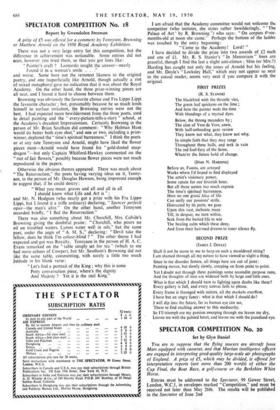SPECTATOR COMPETITION No. i8
Report by Gwendolen Freeman
A prize of £5 was offered for a comment by Tennyson, Browning or Matthew Arnold on the 1950 Royal Academy Exhibition.
There was not a very large entry for this competition, but the difference in achievement was noticeable. Some entries did not scan, however you tried them, so that you got lines like: " Painter's craft ? Leonardo sought the answer—nearly Found it in a woman's smile . . ."
and worse. Some bore not the remotest likeness to the original poetry, and one (superficially like Arnold, though actually a riot of mixed metaphors) gave no indication that it was about the Royal Academy. On the other hand, the three prize-winning pieces are all neat, and I found it hard to choose between them.
Browning was obviously the favourite choice and Fra Lippo Lippi the favourite character ; but, presumably because he so much lends himself to surface imitation, the Browning entries were not the best. I had expected more bewilderment from the three poets, used to detail painting and the " every-picture-tells-a-story " school, at the Academy's decadent Impressionism. Certainly Browning in the person of Mr. Brian Southam did comment: " Why Holman Hunt would do better both eyes shut," and one or two, including a prize- winner, deplored the " time's spiritual barrenness." I think the poets. or at any rate Tennyson and Arnold, might have liked the flower pieces most—Arnold would have found his " gold-dusted snap- dragon "—but only Captain Whitford-Hawkey commented on the "riot of fair flowers," possibly because flower pieces were not much reproduced in the papers.
Otherwise the obvious themes appeared. There was much about " The Resurrection," the poets having varying ideas on it, Tenny- son, in the person of Mr. Douglas Hawson, being impressed enough to suggest that, if he could descry:
" What you mean, graves and all and all in all I should know what Life and Art is " ;
and Mr. N. Hodgson (who nearly got a prize with his Fra Lippo Lippi, but I found it a trifle ordinary) declaring, "Spencer perfecit opus—the man's afire." On the other hand, ,another Tennyson recorded briefly, " I fled the Resurrection."
There was also something about Mr. Churchill, Mrs. Colvile's Browning giving the doubtful praise: " Churchill, who pours no oil on troubled waters, Lymns water well in oils," but the same poet, under the aegis of " A. M. S.," declaring : " Devil take the fellow, does he think I'm colour-blind ? " The other theme I had expected and got was Royalty. Tennyson in the person of H. A. C. Evans remarked on the " table simply set for tea " (which to me had more echoes of Cowper), but Mr. Southam's Browning did not like the same table, commenting, with surely a little too much latitude in his blank verse :
" Let's find a portrait of the King ; why this is some Petty conversation piece, where's the dignity And Majesty ? Yet it is the real King." I am afraid that the Academy committee would not welcome the competitor (who imitates, she states rather bewilderingly, " ' The Palace of Art' by R. Browning ") who says: " On corpses three- months-old at noon she came." Perhaps the bottom of the ladder was touched by the entry beginning: " Come to the Academy! Lord! "
I have decided to divide the prize into two awards of £2 each and one of £1. Mr. R. S. Stanier's " In Memoriam " lines are graceful, though I find the last a slight anti-climax ; Miss (or Mrs.?) Harding has caught not only the tones of Arnold but his feeling, and Mr. Doyle's " Locksley Hall," which may not appear so neat to the casual reader, seems very neat if you compare it with the original.
FIRST PRIZES
(R. S. STANIER) The blackbird with the throstle vies, The green leaf quickens on the lime ; And here the painter weds the time With blendings of a myriad dyes.
Below, the throng meanders by ; The clan of Vere de Vere, anew, With half-unheeding gaze review They know not what, they know not why. In simple faith that they may range Throughout these halls, and seek in vain The red fool-fury of the Seine, Whate'er the future hold of change.
(Tom N. HARDING)
Before us, Fausta, are arrayed Works where I'd hoped to find displayed The artist's visionary power, Some opiate for our feverish hour.
But all these scenes too much express The time's spiritual barrenness.
Here no one grand Idea of life
Can unify our passions' strife.
Distracted by its parts, we gaze Upon this vast, inchoate maze Till, in despair, we turn within, Seek from the buried life to win The healing calm which these deny,
And from their harassed dreams to inner silence fly.
SECOND PRIZE (JAMES J. DOYLE) Shall it not be scorn to me to harp on such a mouldered string? I am shamed through all my nature to have viewed so slight a thing. Since to me disorder festers, all things here are out of joint: Painting moves, but slowly slowly, creeping on from point to point.
Yet I doubt not through these paintings some recondite purpose runs, And the thoughts of men are widened both by large and little ones. What is that which I should turn to lighting upon daubs like these? Every gallery is full, and every canvas fails to please.
Every frame is thronged with suitors, all the markets overflow. I have but an angry fancy: what is that which I should do? I will dip into the future, far as human eye can see,
There to find exalting answer to this mediocrity.
So I'll triumph ere my passion sweeping through me leaves me dry, Leaves me with the palsied heart, and leaves me with the jaundiced eye.










































 Previous page
Previous page